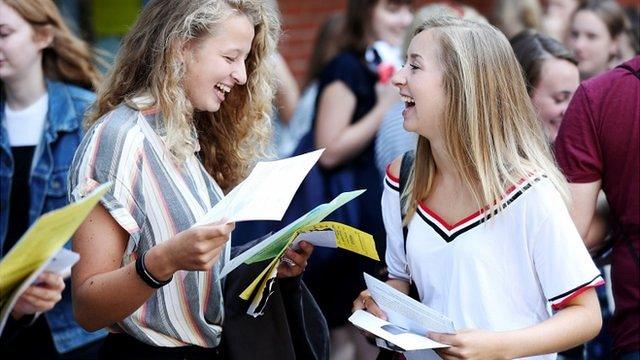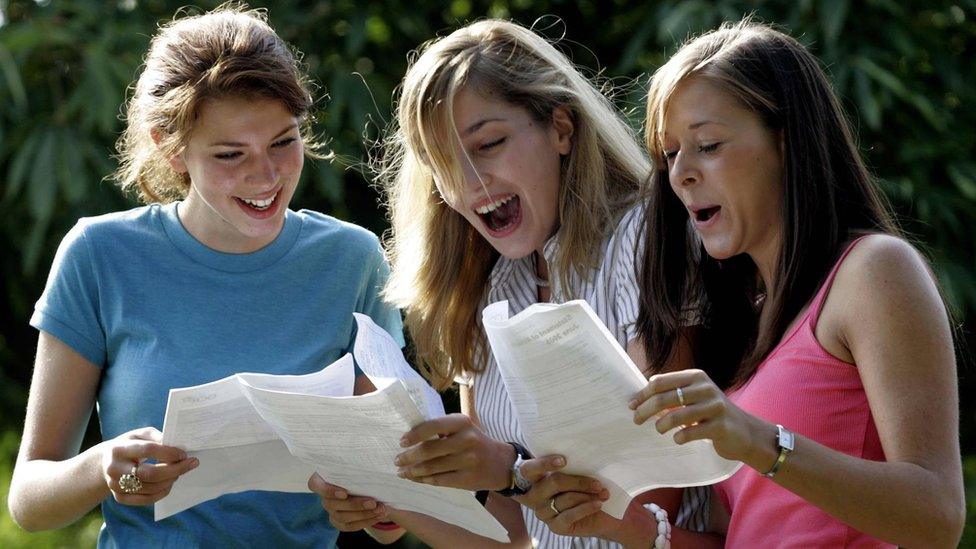Clearing: What are options when grades fall short?
- Published

Results day is not a day of celebration for everyone
Thousands of teenagers across England, Wales and Northern Ireland have been receiving their A-level results. Youngsters in Scotland received the results of its equivalent qualification, Highers, on Tuesday, 8 August. While many are out celebrating their success, others have been left disappointed and facing tough decisions.
Options for students who do not get the grades they need include the university places Clearing, external scheme.

What is clearing?
Clearing is the way that universities and colleges fill any places they still have on their degree courses. If you are in a position to be flexible and have a reasonably good set of exam results, there is a good chance you will find a course.
Clearing allows would-be undergraduates to see which courses still have places remaining. It runs between July and September every year.
You can approach as many universities as you wish during clearing, so do not feel that you have to take the first offer.
What should I do on A-level results day?
Get up early! The sooner you find out your results, the sooner you can pursue alternative options if your grades have fallen short.
You can log on to track, external - a service offered by university admissions service Ucas from 08:00 on results day. This will tell you whether your place at your chosen university has been confirmed.
You could also go into your school or college on results day - that way you can get help and advice from your teachers.

What happens if I do not get the grades I need for university?
Don't panic, because there are plenty of options open to you.
Your first-choice university might let you off if you have slipped a grade - it's worth ringing them as soon as possible to find out if they will still let you in. There's also the possibility that they may offer you a place on a similar, but slightly less popular course.
If you do not have the grades for your first-choice university or course, you may be offered a place with your second choice.
If you miss out on both your firm choice and your insurance choice and still want to go to university, you can try to get a place through clearing, external, which is offered by Ucas. However, most spare places fill up quickly, so you must act fast.


How can I increase my chances of success in clearing?
Preparation is key. To give yourself the best chance of securing an offer, research courses and universities that are of interest to you. Have your answers to hand for questions like: "Why do you want to study on this course?" and "Why would you like to come here?"
Plan to get your results as early in the day as you can to give yourself a head start. Remember, universities and colleges will want to speak to you personally - not to your parents!

How do I find out what courses are available and choose the best one for me?
Official vacancy lists are published on the Ucas website from 00:01 BST on Thursday, 17 August, and in the Daily Telegraph.
You do not have to stick to the subject choices that you made originally. There may be other areas that might suit you better on the basis of the grades you have.

What if my results are better than I expected?
Ucas operates a system called adjustment, external for those candidates who get better results than expected and want to try for a more competitive university. Candidates have a five-day window in which to show their application to universities.
If you do not find a suitable place somewhere else through adjustment, you will remain accepted at your original choice.

What about waiting until next year?
You could consider taking a gap year and reapplying for degree courses this autumn to take up a place in 2017. A year out can be a chance to develop new skills which will all help when writing a personal statement or CV. Volunteer work, travelling abroad or a working for a year are all options to consider.
In the longer term, it may be better to wait a year and go somewhere that is right for you, rather than make a hasty decision you might regret later.
You can also ask your local further education college for information about other routes to degree-level qualifications, such as foundation degrees and diplomas.

Can I challenge my results?
If you think your grades are wrong, you can ask for a re-mark of your papers. But requests for re-marking can only be done through your school or college. This is another good reason to go along to your school or college on results day.
Priority re-marks can be requested for those students with university places at stake. There is a fee for this service, which is reimbursed only if there is a grade change. The Joint Council for Qualifications has guidance on the post-results service, external.
Could I break out and do something else altogether?
Yes, this is always an option. University is not for everyone and many who do not get a degree go on to pursue highly successful and lucrative careers - for example, Sir Richard Branson, Lord Sugar, Kirstie Allsopp and Lady Brady.
Some careers, such as accountancy, can be pursued with qualifications you study for while working. Apprenticeships are another possibility - vacancies are listed on the National Apprenticeships Service , externalwebsite. Sites such as Not Going to Uni, external might give you a few ideas.
By not going to university, there is the added advantage of not accruing student debt. It is estimated the average student in England graduates with a debt of around £44,000 since tuition fees were raised to £9,000 a year in 2012. Recent research has also suggested that having to pay back student debt wipes out any graduate premium for most professions.
However, many professions, such as teaching and law, do require a degree and you could find that some doors are closed to you later in life (or are much harder to open) if you do not have one.

Where can I go for advice?
The Ucas website, external has lots of advice about navigating clearing and adjustment. You can also follow Ucas on Twitter @ucas_online, external or on Facebook.com/ucasonline, external for up-to-date information.
For information on your own progress you can also call the Ucas customer support centre on 0371 468 0468. Lines are open from 07:30 to 18:00 on Thursday, 17 August, 08:00 to 18:00 on Friday, 09:00 to 14:00 on Saturday 19 and 10:00 to 14:00 on Sunday 20, August.
For more general careers advice you can also call the national exam results helpline, external on 0808 100 8000, which is run by Ucas on behalf of the Department for Education. It opens at 08:00 on Thursday 17 August and closes at 15:00 on Wednesday 30 August.
It is staffed by careers advisers and offers advice on sixth form, college, university and other education choices, skills, qualifications, and subject choices, re-sits and re-marks, gap years, vocational learning routes including diplomas, apprenticeships, NVQs, careers and employment, confirmation, clearing, and adjustment and funding.
If you need help with career choices, you can also call an adviser at the national careers service, external on 0800 100 900.

I am Scottish and did not do well in my Highers. What can I do?
Skills Development Scotland has a helpline offering advice, information and support for young people and their parents. The number to call is 0808 100 8000.
Scottish students can still use Ucas and its services to find a university place.

- Published18 August 2016

- Published18 August 2016
